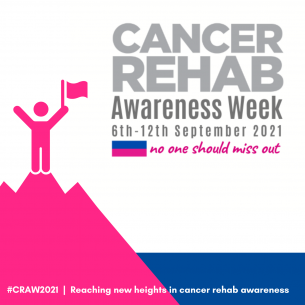
|
Cancer Rehabilitation Awareness Week 2021From the 6th-12th of September is this years Cancer Rehabilitation Awareness Week. We will be posting throughout the week on the important factors associated with Cancer rehabilitation and our involvement in patient focused outcomes. Today we pay awareness to the network of Pink and Steel trained Physio's and rehabilitation specialists, that support cancer patients through New Zealand and internationally in their road to recovery. To learn more please visit: Pink and Steel
|
What can rehabilitation provide?A Cancer Rehabilitation program can reduce side effects of the disease and debilitating cancer treatments, and can improve functional ability, quality of life, psychological and emotional wellbeing, and ultimately, survival. Working with a certified cancer rehabilitation Physiotherapist and other health disciplines with expertise and training in this area can greatly improve your outcomes and recovery following a cancer diagnosis. PINC & STEEL Cancer Rehab Physio's focus is on supporting the whole patient, not just addressing their cancer. They will assess each person individually for the impact of their surgery and cancer treatments and the physical and functional limitations these may have caused. Their certified Physiotherapists help to educate each person on the prevention and early detection of common treatment-related impairments as well as educate about exercise and health promoting behaviours. An individualised exercise program can be prescribed for independent exercise and supervised exercises throughout the course of cancer treatment, aimed at improving function and preventing impairments related to treatment. |
|
|
RecommendationsOutlined by the Canadian Society for Exercise Physiology and the American College of Sports Medicine ■ A goal of 150 minutes of moderate-intensity aerobic exercise spread over 3–5 days and resistance training at least 2 days per week is recommended. ■ Resistance sessions should involve major muscle groups 2–3 days per week (8–10 muscle groups, 8–10 repetitions, 2 sets). ■ Each session should include a warm-up and cool-down ■ It is recommended that, where possible, people living with cancer perform exercise at a moderate intensity (3–6 times the baseline resting state) ■ It is recommended that, where possible, people living with cancer exercise in a group or supervised setting, because that environment might provide a superior benefit or outcome in QOL and muscular and aerobic fitness. |
|
Reference |





